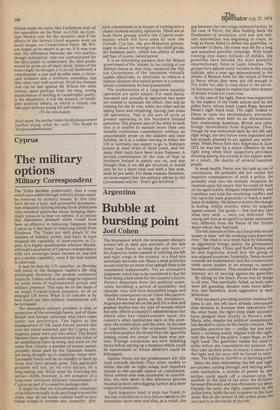Argentina
Bubble at bursting point
Joel Cohen
The impression which the newspaper obituary writers left in their pen portraits of the late Senor Juan Peron, as being the only force o^ the Argentine scene capable of unifying the left and right wings in the country, is a kind ana seemingly accurate one. Many a dead politician would wish for no more of an epitaph than to be considered indispensable. Yet an alternative judgment which has to be considered is that far from being a bad omen for the country's future, Peron's departure from the political scene, while heralding a period of instability and disorder, may well have forestalled longer and bloodier consequence on an Ulster-like pattern.
Had Peron not given up the presidency, Argentina seemed set on the path for a slow and gradual decline into the type of morass which not only affects a country's administrators but which also has repercussions upon the country's other institutions such as the economy, the constitution, and the army. In the case of Argentina, while the economic forecasts have been positive the threat from the 'guerrilla lurking round the corner' has been ever present. Foreign companies are now thinking thrice before setting up a business which could be nationalised or whose directors could be kidnapped.
Neither Peron nor his predecessors left this road towards decline. They were unable to defeat the left or right wings and therefore turned to the secortd option of conciliation. Since neither side was interested in conciliation, the. time spent in this laborious process resulted in both sides digging further into their • respective positions.
Each Argentine head of state has found, to his cost, conciliation to be a failure except in the immediate short term and that, as a result, the gap between the two wings widened further. In the case of Peron, the dam holding back the floodwaters of revolution, civil war and mili tary intervention was beginning to crack. As long as Peron failed to defeat the guerrillas, or surrender to them, the scene was set for a long and sustained guerrilla campaign. With funds running into many millions of dollars, the guerrillas have become the most powerful insurrectionary' force in Latin America. The groups have gained many recruits as the young radicals, who. a year ago demonstrated in the streets of Buenos Aires for the return of Peron (a Peron whom they were not old enough to live under but able to read about in the peronist literature), began to realise that their dreams of utopia would not come true.
. In the case of the right, Peron was supported by the leaders of the trade unions and by the police force, whose head, Lopez Rega, became Peron's right hand man. The right looked to Peron to calm the revolutionary university students who were bent on an ultranationa lism, eradicating American, British and other foreign investments from Argentina. Thus, though he was welcomed back by the left and right wings, the two forces were organised and had already planned to act against any settle ment. When Peron flew into Argentina in June 1973, he was met by a major offensive by the right wing when their supporters provoked shooting among the crowds at the airport with, as a result, the deaths of several hundred people. In weak health, Peron saw his task as one of conciliation. He probably did not realise the negative consequences of such a policy. He probably read into the ecstatic reception he received upon his return that he could sit back on his aged laurels, delegate responsibility, and conciliate and hold the escalating conflict and rely upon his mass popularity to reach a semb lance of stability. He failed to notice the change in feeling, within months, when his popular appeal soured. The goods — few had any idea what they were — were not delivered. The young saw him as an aged European statesman very different from the Peron of the 'forties about whom they had read.
The left denounced him as a fraud who would sooner or later "sell the working class down the river." He tried to woo them back by following an aggressive foreign policy; his government recognised Cuba, China and North Korea and he said Argentina would join the group of non-aligned countries. Internally, Peron moved towards the businessmen and the conservative
trade union leaders in an attempt to restore business confidence. This entailed the complementary act of moving againsi the guerrillas,
By sitting on the fence, Peron was all things to all men. This inevitably failed, as both sides were left guessing, became even more defensive, and therefore, more aggressive in their behaviour.
With his death providing another impetus for them to act, the left have already announced their decision to increase their operations. On the other hand, the right-wing trade unionists have pledged their loyalty to Peron's wife,
Maria, who, despite her political inexperience,
has decided to carry on the family concern. The guerrillas perceive her — unlike her late hus band — as being totally aligned with the right, with the head of the police, Lopez Rega, at her right hand. The guerrillas realise the need to strike before she consolidates her position. As they take up their arms, en masse, it seems as if the right and the army will be forced to intervene. The bubble is, therefore, at bursting point • Since the lines delineating the left and right are unclear, cutting through, and varying with, each institution, a seizure of power by rine section could spark off a counter-coup bY another. In the case at the army the divisions between Peronists and non-Peronists run deep. Outside the army the right, supported by the police force, holds the key to power in the rural areas. But in the streets of the urban areas the ace card is in the hands of the left.



























 Previous page
Previous page